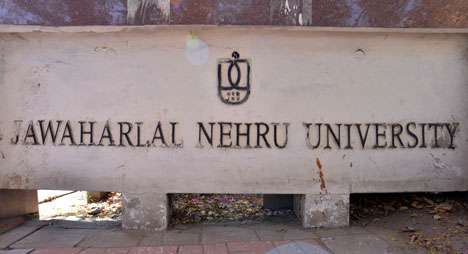
New Delhi: Students of Jawaharlal Nehru University have approached the Lok Sabha’s committee on petitions to restore the constitutionally mandated reservation for the backward sections, diluted since the varsity adopted higher education regulator UGC’s limit on the number of researchers a guide can mentor.
The petition forwarded by CPM MP Jitendra Chaudhury has cited two clauses that have led to a reduction in seats.
One clause is the universal qualifying mark of 50 per cent in the written test for admission to research courses. The other is 100 per cent weightage for the interview once the written test has been cleared.
The petition said the clauses violated Article 15 of the Constitution, which prohibits discrimination on grounds of race, religion, caste or gender; the Central Educational Institutions (Reservation in Admission) Act, 2006, and the SC/ST (Prevention of Atrocities) Act, 1989.
The adoption of the new norms led to more than 90 per cent seats being cut last year. Data compiled by the JNU Teachers’ Association show that of the 227 students who appeared for interviews, only 74 were selected, including one tribal student (0.71 per cent), three Dalits (2.2 per cent) and 13 from the Other Backward Classes (9.4 per cent).
The percentages are much lower than the legally binding seat reservation of 15 per cent for SCs, 7.5 per cent for STs and 27 per cent for OBCs.
After Delhi High Court upheld the new admission policy in March last year, HRD minister Prakash Javadekar had been questioned in the Rajya Sabha by then JDU MP Sharad Yadav and others. Javadekar had replied: “The process of appointment and interview has already started. Within a month or two, 300 teachers will be recruited. When the academic session for 2017 starts, more seats will be available in MPhil/PhD courses than the 970 offered last year.”
This year, only 720 seats have been offered — and only a fraction of this number has been called for interviews, which are in progress. Fewer than 40 teachers have been hired since January last year.
Last August, the JNU Teachers’ Association had approached the parliamentary committee for the welfare of Other Backward Classes, which was satisfied by the administration’s reply.
The latest petition comes after protests by both students and faculty members from the reserved categories, as the dilution of reservation is expected this year too.
Three sets of signatures have backed the petition. These include signatures of the four executive members of the JNU Students’ Union, officebearers of all major student groups barring the Sanghbacked ABVP, and more than 50 students affected by the new norms.
“More than 30 MPs from the CPM, CPI, Congress, NCP, Rashtriya Janata Dal and the Indian National Lok Dal will also petition the HRD minister tomorrow,” Chaudhury told The Telegraph.
NCP MP D.P. Tripathi has already written to Javadekar demanding his intervention in several restrictive actions that have led to classes being suspended in JNU since January.
Last month CPM MP T.K. Rangarajan had demanded the urgent dismissal of JNU vicechancellor M. Jagadesh Kumar.
The same evening police had cracked down on a march by JNU teachers and students, leaving several people, including journalists, injured.











